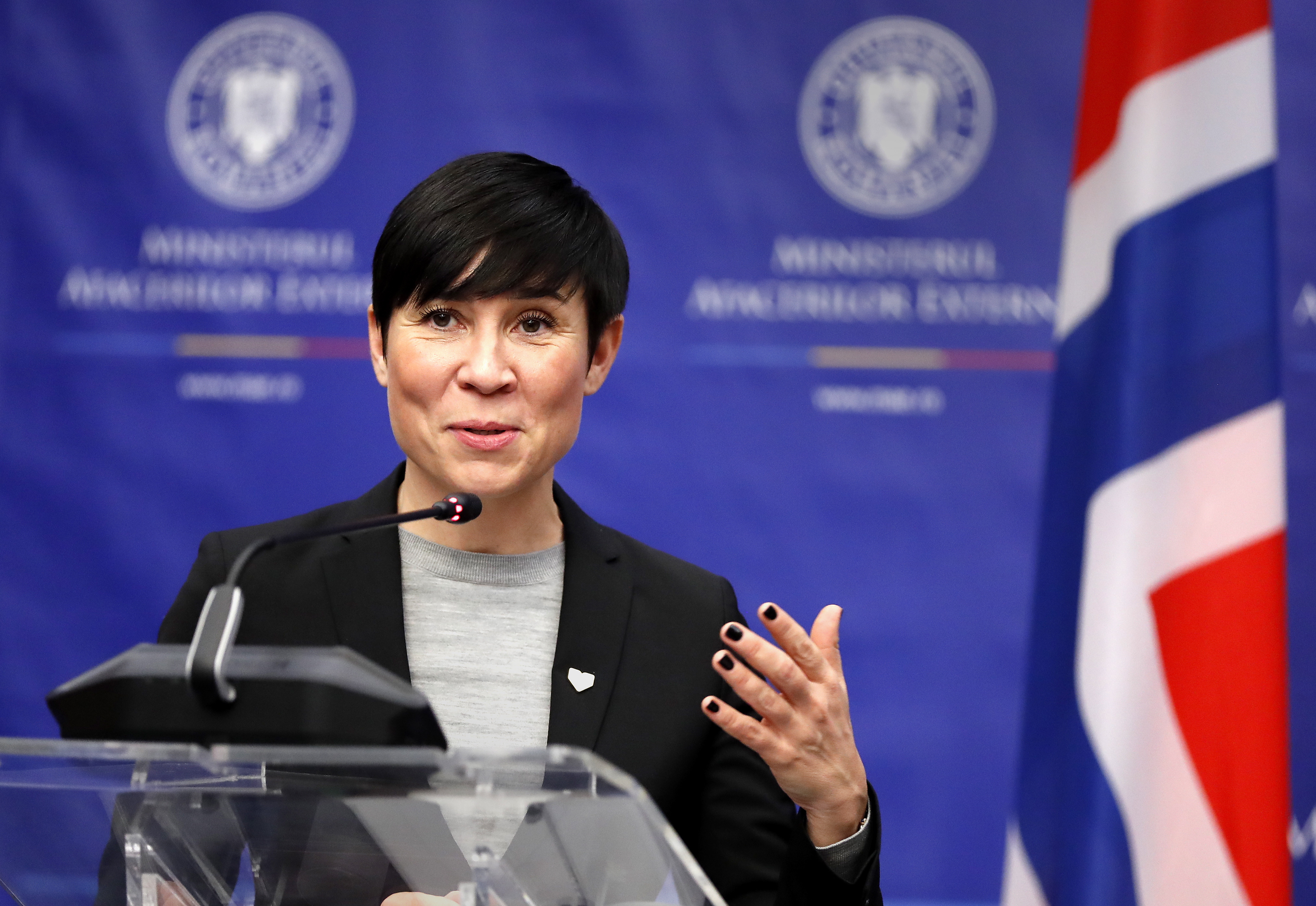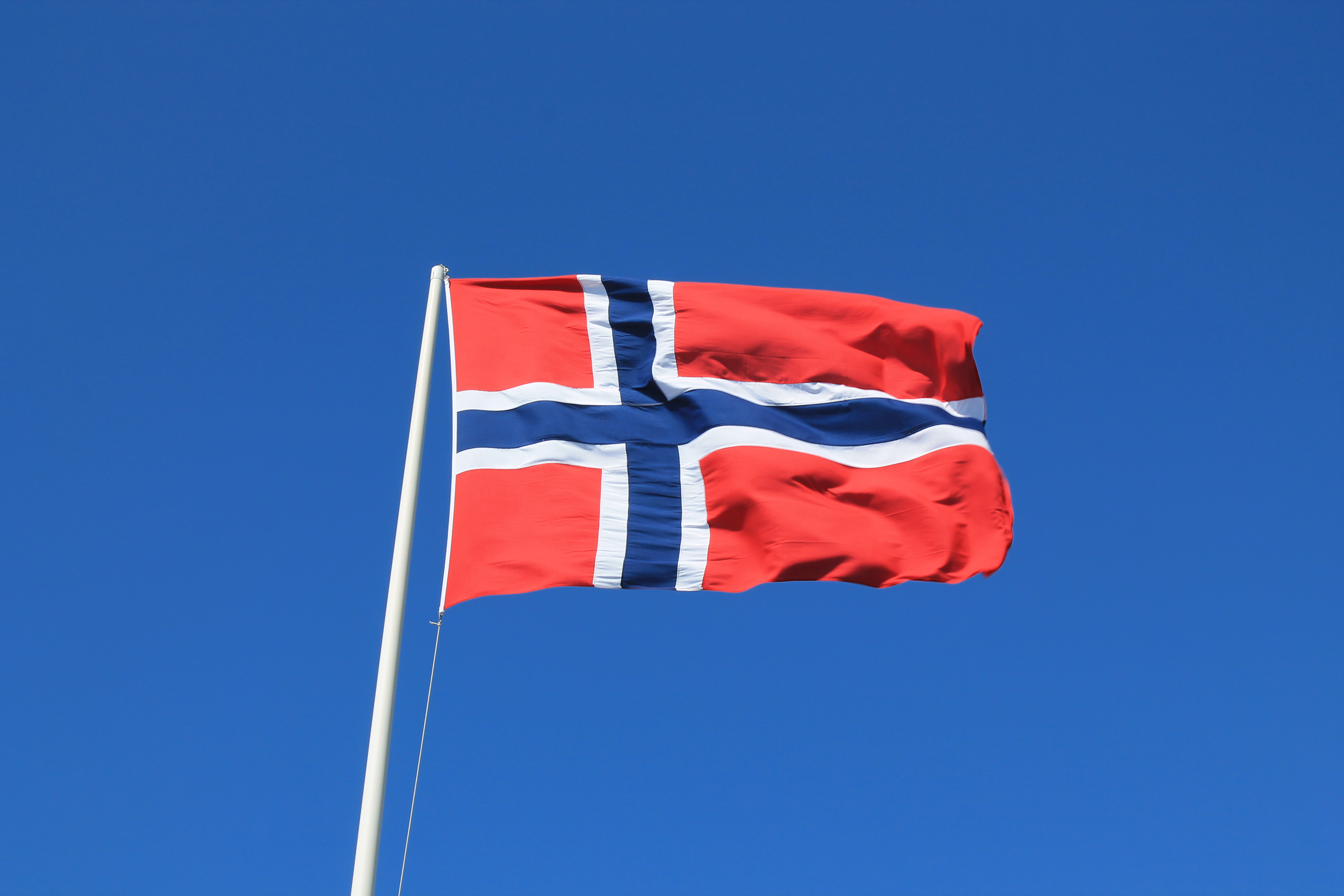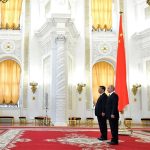THE WARSAW INSTITUTE REVIEW
Date: 4 December 2019 Author: Sergiusz Moskal
US or EU? Is there a strategic partnership dilemma for Norway?
The US has been a traditional ally of Norway for 70 years as well as its main guarantor of security. Despite the fact that both countries share a strong bond at the strategic level, there are some incongruencies between them on the level of values and their visions for international cooperation. Dynamic geopolitical transformations and the seemingly inevitable change in the global balance of power determine the question of the future role of the US as a guardian of the global order. At the same time, increasingly bolder ambitions are being demonstrated by the EU, which intends to increase its participation in the security system on the Old Continent. Therefore, in the near future, the EU may appear as a viable alternative and a potential strategic partner for Norway. There are many indications that, at least for now, the number one position among allies is still reserved for the United States.

A further escalation in tensions between Washington and Tehran, which developed in June 2019, did not go unnoticed in Norway, where it provoked vigorous discussion. Naturally, the immediate cause was the fact that there had been attacks on tankers belonging to Norwegian shipowners, which took place within a few weeks of each other in the Gulf of Oman. There is no doubt, however, that the main subject of conversations in Norwegian political and expert circles was the issue of broadly understood state security in the context of alliances that connect Norway with other players on the international stage. The majority of decision-makers there asserted the view calling for closer cooperation with the US. Others, however, suggested that Norway’s security should be more closely correlated with European defense architecture, and possible partners should be sought among members of the EU. Intriguingly, the two contrasting arguments did not result from differing positions of the government and opposition. The positions were also polarized within the coalition currently forming Erna Solberg’s office.
The strategic partner with whom Norway should collaborate with for the coming years has been reflected upon and contemplated in this Scandinavian country for some time. Looking at Norway’s participation in international alliances and organizations, one could pinpoint in which direction its foreign policy is poised. Transformations witnessed in recent years and the dynamics of international relations mean that the selection of the Norwegian strategic ally has ceased to be as unambiguous as it may have seemed recently. Moreover, a likelihood exists that there is a conflict of values. What constitutes a peculiar foundation of the Norwegian perception of reality – a global order secured by various institutions, cooperation of entities of international relations, human rights, etc. – does not seem to be at the top of the list of priorities for the incumbent administration of President Donald Trump. There are even reconsiderations on the future role of NATO as the primary guarantor of international security. Can Norway and the EU get closer in these circumstances? Would Norwegian-American cooperation, formed on the basis of many years of tradition, despite the emerging discrepancies, gain even more momentum?
Recalibration of foreign policy vectors
For the following contemplations, it is worth examining the events in 2008, which constitute an important temporal turning point. At the time, Norwegian foreign policy was undergoing a kind of recalibration, the context of which extends beyond Norway and onto the global dimension. The economic crisis had caused changes in the perception of international security. As known, economic stagnation creates potential to lead to political and systemic breakdowns, which may have been ultimately resonated most clearly in the only global hegemon; the US, though it was also loud and clear in international organizations such as the UN. It played a role in what could be perceived as reduced intent for the US to exercise its involvement in maintaining international order . Thus, there is a danger for Norway, whose main guarantors of security are the US and the North Atlantic Alliance.
The second, no less important event of 2008 was the Russian aggression on Georgia. It became clear that a similar scenario could not be definitively ruled out in the case of Norway. As a relatively small state, it can also become an object of analogous assault. Amongst others, it contributed directly to the issue of security returning to Oslo’s agenda.
Cold War superpower rivalry had the greatest external influence on Norwegian security policy , and made clear that security itself was an immutable variable. This changed in the 1990’s. As in other countries of the Old Continent, after the fall of the Iron Curtain, defense expenditure was reduced. In its stead, the focus was realigned mainly onto foreign operations under the auspices of NATO and the international community. The offensive capabilities of the armed forces had also decreased, where in 2008, a record low defense spending was noted for Norway. In Norway’s foreign policy, the concept of security began to be supplanted by the concept of prestige, and realism in international relations was replaced by idealism .
Yet, as a result of those dynamically changing circumstances in 2008, Norway’s foreign policy underwent a shift in exactly the opposite direction – from idealism to realpolitik. The focus was on strengthening close relations with Washington and securing Norwegian interests. Changes have also taken place in defense policy, significantly increasing its budget and reactivating the process of rearming. Norway in the years 2007-2011 spent on importing military equipment four times more than in the corresponding period between 2002 and 2006. The then cabinet of Jens Stoltenberg also opted for expanding the security formula based on the concept of an asymmetrical and stronger partnership – in one aspect, the North Atlantic Alliance; in the second, closer ties to European security policy; and in a third, a proposal to create a Nordic defense union .
Especially the latter proposal was strongly pushed by the government headed by the current NATO Secretary General. However, the project was not implemented. The proposed solutions were to constitute a new shape of security architecture considering the character of NATO itself evolved after the end of the Cold War.
A Triad of Security
As quoted by Robert D. Kaplan, Napoleon claimed that to know the foreign policy of a country it is enough to know its geographical location . It cannot be denied that geopolitics largely determines the foreign and security policy pursued by the Oslo authorities. Norwegian Institute for Foreign Policy (NUPI) analyst Nina Græger aptly describes this as a metaphorical triangle whose vertices are the US, Russia and the EU , which constantly influence Norwegian foreign and security policy. It would seem the two most-mentioned actors exert the strongest influence. The EU’s role is still difficult to categorize unequivocally, taking into consideration that its position may evolve.
These actors influencing Norwegian security policy are also subject to geopolitical influences of their own. Norway, with all its resources and limitations takes into account the broader context of contemporary international landscape, that is, the ways in which namely China, but also regionally-dominating states aspiring for greater influence on the international arena, such as South Africa, Brazil, India, influence the policies of the US, NATO, the EU, and Russia. Norwegian decision makers keep these geopolitical polarities in mind in their calculus of approaches to challenges in its most immediate vicinity, as well as how to operate in the more global dimensions.

A fundamental security provider
In an exposé of the Norwegian Minister of Foreign Affairs Ine Marie Eriksen Søreide delivered to the parliament in March this year, it was clearly stated that “the United States is Norway’s closest continental ally” . The head of Norwegian diplomacy also emphasized that since the end of World War II, there had been no more important country for Norway than the US. Eriksen Søreide listed the individual points on which the Norwegian-American strategic partnership is founded, underlining the role of the US as a guarantor of the defense capabilities of the North Atlantic Alliance and the chief architect of global order based on binding international cooperation . Indeed, it is difficult to find any decisions or statements of representatives of subsequent Norwegian cabinets questioning the strong ties connecting Norway with the US, or Norwegian policy towards NATO .
The above declaration could ultimately cut off the hypothetical considerations about a possible alternative to the existing bilateral cooperation.
Norway, like many other countries with similar international positioning, is a consumer of security. Its primary guarantor is the US with technological and military advantage, making bilateral relations with the US a key pillar of defense policy firmly anchored together with allied support via NATO. American stabilizing presence became so common that, as Asle Toje notes, the Norwegians perceived it especially in the 1990’s as an integral and indisputable element of the international order . At the same time, Norway was eager to engage in numerous international operations under the auspices of NATO. It resulted from responsibility to the allied commitments, but also from the need of individuals in leadership positions to expand influence and build one’s status, especially in Washington . This specific connotation has, at least in part, contributed to opinions being voiced that question the core fundaments of the military alliance with the US, a primary component since 1945 of Norway’s foreign policy.
In that very same exposé in March, Ine Marie Eriksen Søreide recognized that it is the political changes taking place in the US as one of the variables shaping Washington’s new foreign policy. President Trump’s administration challenges the legitimacy of bearing American leadership costs and the benefits of international cooperation . This is a new challenge attributed to growing divergences within NATO in Norwegian foreign policy and understandably causes worry for decision makers in Oslo. A potential conflict of values underlying Norwegian foreign policy and the current direction of foreign policy employed by the Trump administration meant that in Norway, there was once again a discrepancy between the pursuit of a policy based on idealism and that of realpolitikk.
Naturally, however, the risk of a conflict of values is not determined only by the incumbent at the White House. The situation is not new and similar dilemmas have accompanied Norwegian decision makers in the recent past. Initial misunderstandings have already occurred in the case of the invasion of Afghanistan. The American intervention in Iraq in 2003 put bilateral relations to the test and highlighted the divisions between Europe and the US. Not only did Norway not participate in the Second Gulf War, but also refused to support the American operation. Only skillful diplomatic footwork by the then head of government Kjell-Magne Bondevik and Foreign Minister Jan Petersen avoided a major crisis in Norwegian-American relations .
Between 2005-2013 there were further Oslo-Washington misunderstandings. Issues such as the ban on using the cluster munitions, the war in Iraq, and the lack of consensus on the construction of the American anti-missile shield in Europe led to a partial freezing of contacts. It is symptomatic that Bondevik’s successor, Jens Stoltenberg, as the first Norwegian prime minister, did not receive the invitation of the American president to pay an official visit to Washington . In a specific clinch there were also representatives of the lower levels of administration of both countries, which significantly complicated the joint work of defense and diplomacy ministries.
Barack Obama’s presidency brought rapprochement between Oslo and Washington again, but fruitful cooperation came under a big question mark with the election of Donald Trump. In Norway, there have been voices about toughening criticism of the US or even revising its bilateral relations. The change in moods is noticeable, but it has no practical dimension yet. As Nina Græger notes, the occasional criticism encountered by the Trump administration does not paralyze functioning cooperation in the military, diplomatic or civil fields, which continues without major disturbances. Thanks to joint military practices, which include exchange of knowledge and experience at the officer level, maneuvers, and constant dialogue between politicians and diplomats of both countries have been able to significantly depoliticize a number of elements pertinent to mutual cooperation . The reduction of recent tensions does not change the fact that the Norwegians do not always accept American moves in global politics.
An expensive and demanding partnership
As Norway is foremost a consumer of security, military dependence on Americans is also emphasized by the head of diplomacy Ine Marie Eriksen Søreide . The costs of US security guarantees borne by the Norwegian state raise the question of whether the price that the government in Oslo pays for security goes far beyond the level of financial outlays. Due to the US voluntary withdrawal from the role of the primary guardian of international order, American security guarantees will no longer be a universal good. As a result, not only would their price increase, but the requirements of the Americans themselves regarding potential interested parties will also increase. Former Secretary of Defense Robert Gates, in the administration of George W. Bush and Barack Obama, disapproved of European defense cuts. He argued that Washington is tired of taking the burden of maintaining NATO and responsibility on behalf of those who avoid both risk and cost. . Currently, Americans place even greater emphasis on fulfilling the obligation to transfer 2% of GDP on defense by members of the North Atlantic Alliance. Norway was one of the countries to which President Trump issued an official letter in 2018, calling for increased spending. As one can anticipate, countries that will not meet the 2% requirement must take into account the possibility of falling outside the sphere of American immediate interests. It is no longer in the US interest to cover defense spending on countries that are only partially willing to support US geopolitical goals.
The new security landscape and the divisions within NATO imply that Americans want to see those who among their allies in one way or another will support the implementation of global US interests. Asle Toje claims that for Norway this will mean higher security guarantee costs also in the form of military and diplomatic support for Washington’s foreign policy . Norway is one of the few countries that wants to stay among the closest allies of the US. That is why the authorities and diplomatic officials are making effort to reassure Americans of their loyalty. They also realize that requirements will grow over time. In practice, this may mean the participation of the Norwegian Armed Forces in US operations far from Europe . In 2011, Operation Unified Protector in Libya enjoyed important contributions made by Norwegian aviation which clearly signalled that Norway is walking side by side with the Americans. Hence, it cannot be ruled out that in the future Norway, paying its allied obligations, will take part in similar operations.
Considering the cost of the partnership with Washington, a plethora of global conditions also affect Norway’s security, though primarily the Russian vector of the security triad stands out. Strengthening relations with the US has the potential to worsen relations between Oslo and Moscow. US-Russian tensions can do so equally. Norway has traditionally sought to maintain a balance between the two, having attached great importance to nurturing neighborly relations and building cross-border agreements. Supporting American geopolitical goals, which are oft directly contradictory to Russian interests, could put Norway at a disadvantage towards Russia. Thus, the balancing demands the very considerable effort and savvy decision-making the Norwegian authorities are striving to employ.
Support Us
If content prepared by Warsaw Institute team is useful for you, please support our actions. Donations from private persons are necessary for the continuation of our mission.
EU: a realistic alternative or mirage?
The rising costs arising from the strengthening of the alliance with Washington and the potential risk of a conflict of values against President Trump’s foreign policy have meant that in recent years, the Norwegians have also begun to look towards Brussels and European security architecture. The discussion on this topic that is taking place in Norway brings some interesting insights. The first place comes with a definitely differentiated approach to the issue of the European Community as a pillar of continental security. In other words, two main currents set the tone of the debate. The division axis is not as obvious as it may seem. Naturally, there are declared opponents of abandoning the alliance with the US in favor of the EU. They consider the possibility of such quite absurd. On the other hand, there is a vision based on moderate optimism towards Brussels. It postulates strengthening of continental relations and development of military cooperation. Alongside these two notions, there is another which puts NATO and the EU at opposite poles. In this case, the EU is considered not only as an alternative to the North Atlantic Alliance, but also as a player who could potentially replace NATO as a guardian of the global order.
Although having vetoed EU accession twice via its citizens’ votes, it would be unjust to assess that Norway seems uninterested in the development of the European security architecture. Practical cooperation in the defense dimension takes place within the framework of the EU Common Security and Defense Policy. Although the Norwegian contribution to European security is relatively small, Norway is involved in several forms of both military and civil cooperation with the EU. Important in this context is the Norwegian participation in the EU crisis management in the military and civil areas, which results from the framework agreement adopted in 2004. Among the EU missions in which the Norwegians participated, there are Bosnia, Macedonia, Afghanistan, Iraq, Indonesia, Kosovo and Ukraine. One of the more well-known operations with the Norwegian contribution is Operation Atalanta against pirates off the coast of Somalia. In 2008, in 2011 and 2015, Norway participated in the exercises of one of the EU battle groups under the command of Sweden (Nordic Battle Group). In addition, Norway has agreements with the EU regarding the exchange of classified information. Norway, at the earliest among third countries, already established cooperation with the European Defense Agency EDA in 2006. Until 2011, it was the only non-EU country that was part of this cooperation. Activities in context of the European Defense Fund are also carried out with the participation of Norway.
Such EU-Norwegian cooperation makes it difficult for the authorities in Oslo to define Brussels in the precise terms of a ‘strategic partner’. Nevertheless, recent years have set security as one of the highest EU priorities. Brexit is particularly important from this point of view. The EU will find itself in a new security situation deprived of one of the militarily strongest countries on the Old Continent. Divorce with the UK necessarily forces the Community to intensify its security and defense activities. That is why in 2016 Federica Mogherini announced the Global Strategy for Foreign and Security Policy of the EU. It assumes that the EU will enter a new level of ambition in securing its global interests, and therefore intends to become a major player in the context of security. If Brussels were able to strengthen relations with the US, it would have a positive impact for Norway, reducing needs for any sort of trade-offs. The complementarity of one entity with the other would strengthen European security architecture. In this case, Norway would like to be more involved in defense cooperation. However, taking into account the resentment of the Trump administration and its own vision of security policy conducted in isolation from NATO, which is postulated by Emmanuel Macron, it is difficult to expect Norwegian support for such activities.
It should also be stressed that all the EU’s current provisions on security and defense policy are, from the Norwegian point of view, a serious drawback. There was no space for dialogue with third countries. And this is a real problem in bilateral relations. Having no influence on decisions taken in Brussels, Norway will be difficult to treat the EU as a strategic partner . The EU also lacks a sort of collective defense pact. Nina Græger also draws attention to the issue of Member States’ security guarantees. The European Community does not have an analogous mechanism to Article 5 of the North Atlantic Treaty . Therefore, the EU cannot be seen as a security provider. Asle Toje goes even further in assessing the current condition of the EU and its members, claiming that Europe is without its representation in a global concert of powers for the first time in modern history .
In this context, the discussion about the possible replacement of NATO by the EU can currently be regarded only as a curiosity or a manifestation of wishful thinking. NATO Secretary General definitely excludes this possibility. Jens Stoltenberg is of the opinion that the EU will never achieve a sufficient level of military capabilities . The main reason is low defense spending. After Brexit, 80% of NATO’s defense spending will be borne by non-EU countries. He also regards a similar scenario is likely on the mind of German diplomacy head Heiko Mass, who wrote in one of the columns for Der Spiegel that “without the US, neither Germany nor Europe will be able to defend themselves effectively” .
Status quo maintained in the North
Despite the strengthening of European cooperation in areas such as security and defense over the past two decades, the EU has left its mark on Norway’s security policy to a relatively smaller extent. The main barrier is primarily the poor formal status of third countries which are not members of the Community. Although Norway is selectively invited to participate in various projects (e.g. under Permanent Structured Cooperation – PESCO), but without real views on admission to the decision-making process. If, after removing formal obstacles, Norway in the long term decided to become more actively involved in EU defense programs and initiatives, then the EU would be more strongly included in the agenda of the Norwegian security policy. According to some experts, the development of cooperation would also depend on support for the EU itself among Norwegians. And this, unlike other Scandinavian countries, remains relatively low.
NATO’s standing and the traditional Norwegian-American partnership are strong in Norway. The growing divergence within the Alliance and the prospect of reducing US involvement raises legitimate concerns in Norway. Just like the policy of President Trump’s administration, which is not always receiving total approval in Oslo and sometimes conflicts with that system of values. At the same time, partnership with the US will entail increasing costs and obligations. However, it seems that at present Norway cannot afford a foreign policy which will stand in opposition to the US and elevates risks associated with individuality. The European landscape is characterized by a high rate of security consumers, which is inversely proportional to its providers. That is one of the reasons why the Norwegian authorities sought to increase the American contingent in Norway. Only the US creates real added value in the area of security. The EU, for now, has insufficient capacity and resources to provide a viable alternative.
All texts published by the Warsaw Institute Foundation may be disseminated on the condition that their origin is credited. Images may not be used without permission.














